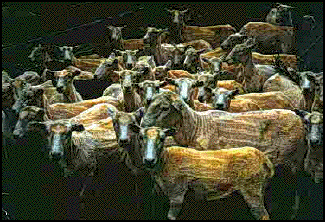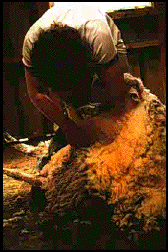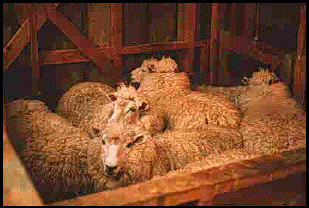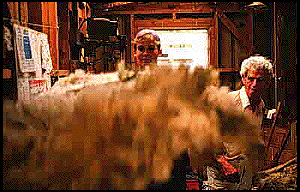 to
Ecotourism Research Home Page
to
Ecotourism Research Home Page
Stalking the Wild KiwiBy David T. SchallerChapter Seven |
 The warming days of October brought shearing season to New Zealand. We contacted a farmer named Henry Abbott, who lived near the northern shores of South Island, and got ourselves on his shearing crew.
Henry's homestead straddled a ridge above Thompson Valley, near the city of Nelson. Late one afternoon we hitched up the dirt road leading into the valley, then hiked up to the ride and the house. Henry greeted us at the door. He had trim gray hair and a slender gray moustache in the manner of English matinee idols, but his hollow cheeks tightened his face into an bony triangle, and his thin, taut voice sounded as though someone was sitting on his chest. I couldn't decide whether he looked scrawny or not--the muscles may only have been compact, and the skin shrink-wrapped around them. But he definitely didn't look like the meaty, rugged Kiwi farmer of lore.
He differed from stereotype in other ways as well. New Zealand's first Pakeha farmers were English laborers who had been driven from their rural homes by the decline of agriculture, only to suffer amidst the Dickensesque squalor of the cities. A colonial reformer named Edward Gibbon Wakefield called them the deserving poor, because they deserved to escape the evils of the industrial revolution. Henry came from England also, but it was not the horrors of industrialization that sent him to New Zealand but rather the idealism of the 1960's. Henry wanted to help build a better world. Though trained as a schoolteacher rather than a farmer, he wanted to work the land, and the land he decided to work was in New Zealand.
It was a natural choice. New Zealand had long served as a platform for attempts at utopia, dating back to Wakefield's concerted effort to establish a perfect colony in the 1830's and '40's. Wakefield envisaged an ideal form of agrarian capitalism which would avoid the mistakes made by other struggling colonies such as Australia, where land was so cheap that every settler could buy their own parcel and none were left to help work it. The key to Wakefield's utopia was his concept of a "sufficient price" for land. By setting this price carefully, he postulated, an ideal proportion of laborers and owners could be maintained. Land should cost more than laborers could afford to pay outright, but not so much as to discourage their long-term hopes. Thus laborers would be encouraged to work the land for capitalists, who in turn would be guaranteed a dependable work force. And money from land sales would pay for the transportation of more settlers from England, to replace those who had finally bought their own land. Capitalism, Wakefield thought, only needed to be properly designed for it to succeed.
Times had changed by the time Henry Abbott decided to go to New Zealand. Karl Marx had devoted an entire chapter of Das Kapital to a scathing analysis of Wakefield's plan. As the world grew more industrialized, however, the appeal of an agrarian utopia flourished. Marx's own proposals inspired intellectuals like Henry to seek a perfect form of communism rather than of capitalism, and in 1970, he and some fellow idealists formed a commune and went to New Zealand to implement their dreams.
They settled in Thompson Valley and scattered themselves across its floor, up its steep slopes, along its framing ridges, and far back in its upper reaches. They practiced permaculture, a horticultural technique which respects the needs and capabilities of the land. They planted trees for windbreaks. They grew guava and babaco on the frost-free slopes, carob and olives on the drought-prone slopes, and kiwifruit and berries on the mild valley flats.
Wakefield preferred to populate his colony with young married couples, to spare his Utopia any sexual frustration and social instability. Similarly, Henry came to New Zealand with a female companion, but the labor didn't cement their relationship. They broke apart, and the split plowed through the valley, uprooting friendships, loyalties, principles, and ideals--everything that the commune was sowed upon. Most members of the commune left the valley. Henry, along with a few other tattered idealists, stayed, but the empty house and broken valley seemed to constantly remind him of the debacle.
Henry told us none of this; we learned it from a visiting acquaintance of his. Though Henry tried to be hospitable (upon learning of our quest, he brought out several books about New Zealand birds for us to browse through), he was essentially not communicative. He drew his face as tight as a fist. I watched him nervously, wondering whether the pressure would rupture through in our presence. But he never relaxed his grip, and little else escaped either; wit, tranquility and even the pleasure of casual conversation were muzzled.
"He scares me," Susan said after we had retired to our loft bedroom the first evening. "It's like being around an unexploded bomb. I feel like tiptoeing whenever I walk and whispering whenever I talk." In the days that followed, however, we found it far better to chat constantly and mindlessly in Henry's presence, to battle the oppressive vacuum. And we turned to the kitchen for relief. One of our jobs on the farm was to cook, so we foraged through the storage bins and whipped up a flurry of meals--potato soup, asparagus quiche, kiwifruit muffins and spaghetti. Henry showed more pleasure over our cooking than anything else we did on his farm--it had been a long time, he implied, since he had eaten so well.
The warming days of October brought shearing season to New Zealand. We contacted a farmer named Henry Abbott, who lived near the northern shores of South Island, and got ourselves on his shearing crew.
Henry's homestead straddled a ridge above Thompson Valley, near the city of Nelson. Late one afternoon we hitched up the dirt road leading into the valley, then hiked up to the ride and the house. Henry greeted us at the door. He had trim gray hair and a slender gray moustache in the manner of English matinee idols, but his hollow cheeks tightened his face into an bony triangle, and his thin, taut voice sounded as though someone was sitting on his chest. I couldn't decide whether he looked scrawny or not--the muscles may only have been compact, and the skin shrink-wrapped around them. But he definitely didn't look like the meaty, rugged Kiwi farmer of lore.
He differed from stereotype in other ways as well. New Zealand's first Pakeha farmers were English laborers who had been driven from their rural homes by the decline of agriculture, only to suffer amidst the Dickensesque squalor of the cities. A colonial reformer named Edward Gibbon Wakefield called them the deserving poor, because they deserved to escape the evils of the industrial revolution. Henry came from England also, but it was not the horrors of industrialization that sent him to New Zealand but rather the idealism of the 1960's. Henry wanted to help build a better world. Though trained as a schoolteacher rather than a farmer, he wanted to work the land, and the land he decided to work was in New Zealand.
It was a natural choice. New Zealand had long served as a platform for attempts at utopia, dating back to Wakefield's concerted effort to establish a perfect colony in the 1830's and '40's. Wakefield envisaged an ideal form of agrarian capitalism which would avoid the mistakes made by other struggling colonies such as Australia, where land was so cheap that every settler could buy their own parcel and none were left to help work it. The key to Wakefield's utopia was his concept of a "sufficient price" for land. By setting this price carefully, he postulated, an ideal proportion of laborers and owners could be maintained. Land should cost more than laborers could afford to pay outright, but not so much as to discourage their long-term hopes. Thus laborers would be encouraged to work the land for capitalists, who in turn would be guaranteed a dependable work force. And money from land sales would pay for the transportation of more settlers from England, to replace those who had finally bought their own land. Capitalism, Wakefield thought, only needed to be properly designed for it to succeed.
Times had changed by the time Henry Abbott decided to go to New Zealand. Karl Marx had devoted an entire chapter of Das Kapital to a scathing analysis of Wakefield's plan. As the world grew more industrialized, however, the appeal of an agrarian utopia flourished. Marx's own proposals inspired intellectuals like Henry to seek a perfect form of communism rather than of capitalism, and in 1970, he and some fellow idealists formed a commune and went to New Zealand to implement their dreams.
They settled in Thompson Valley and scattered themselves across its floor, up its steep slopes, along its framing ridges, and far back in its upper reaches. They practiced permaculture, a horticultural technique which respects the needs and capabilities of the land. They planted trees for windbreaks. They grew guava and babaco on the frost-free slopes, carob and olives on the drought-prone slopes, and kiwifruit and berries on the mild valley flats.
Wakefield preferred to populate his colony with young married couples, to spare his Utopia any sexual frustration and social instability. Similarly, Henry came to New Zealand with a female companion, but the labor didn't cement their relationship. They broke apart, and the split plowed through the valley, uprooting friendships, loyalties, principles, and ideals--everything that the commune was sowed upon. Most members of the commune left the valley. Henry, along with a few other tattered idealists, stayed, but the empty house and broken valley seemed to constantly remind him of the debacle.
Henry told us none of this; we learned it from a visiting acquaintance of his. Though Henry tried to be hospitable (upon learning of our quest, he brought out several books about New Zealand birds for us to browse through), he was essentially not communicative. He drew his face as tight as a fist. I watched him nervously, wondering whether the pressure would rupture through in our presence. But he never relaxed his grip, and little else escaped either; wit, tranquility and even the pleasure of casual conversation were muzzled.
"He scares me," Susan said after we had retired to our loft bedroom the first evening. "It's like being around an unexploded bomb. I feel like tiptoeing whenever I walk and whispering whenever I talk." In the days that followed, however, we found it far better to chat constantly and mindlessly in Henry's presence, to battle the oppressive vacuum. And we turned to the kitchen for relief. One of our jobs on the farm was to cook, so we foraged through the storage bins and whipped up a flurry of meals--potato soup, asparagus quiche, kiwifruit muffins and spaghetti. Henry showed more pleasure over our cooking than anything else we did on his farm--it had been a long time, he implied, since he had eaten so well.
 Gavin clipped his razor to the articulated shearing arm that was jointed to the wall. The sheep began to stir. Gavin slid up the gate to one bay, grabbed a reluctant sheep and hauled it out. He rolled it on its back, tucked its head between his legs and plowed the razor deftly through its belly wool. Strips of wool peeled away, baring the sheep's ribbed skin. The animal soon quit bleating and yielded to his blade. Gavin firmly rotated the beast, shearing its flanks and then its spine.
In the transformation from coat to fleece, the wool somehow stayed in one piece--a piece that was growing swiftly as the sheep shrank in size. Gavin mowed off the last strip and severed the fleece from the flesh. Ross gathered up the wool and tossed it onto the table, where we three 'students' went to work on it. I found it difficult and occasionally painful to extricate thorns and twigs snagged on the bristly fibers of the chest and flank wool, but these were a true pleasure compared to the delicacies that accumulated on the sheep's backside.
Whenever excrement tumbles out of a sheep in a cavalcade of blackish-green, pea-sized pellets, a few globules, or dags as they are colloquially known, are snared by the dense thicket of wool around the anus. Over time, a colony of dried manure-balls is established, which betrays a running sheep not quite as gracefully as windchimes on a bicycle. "Rattle your dags," Ross would tell us with a grin: hurry up.
Gavin sheared off the thickest clusters of dags and set them aside for special handling, but plenty of "the shitty bits," as Ross also called them, remained in the fleece for us to pick out by hand. Most were hard and dry, tearing off in a woolly clump, but fresher specimens were still soft and smeared easily. They and the woolly filaments stuck to my fingers, which were greased with a sheen of lanolin.
Gavin clipped his razor to the articulated shearing arm that was jointed to the wall. The sheep began to stir. Gavin slid up the gate to one bay, grabbed a reluctant sheep and hauled it out. He rolled it on its back, tucked its head between his legs and plowed the razor deftly through its belly wool. Strips of wool peeled away, baring the sheep's ribbed skin. The animal soon quit bleating and yielded to his blade. Gavin firmly rotated the beast, shearing its flanks and then its spine.
In the transformation from coat to fleece, the wool somehow stayed in one piece--a piece that was growing swiftly as the sheep shrank in size. Gavin mowed off the last strip and severed the fleece from the flesh. Ross gathered up the wool and tossed it onto the table, where we three 'students' went to work on it. I found it difficult and occasionally painful to extricate thorns and twigs snagged on the bristly fibers of the chest and flank wool, but these were a true pleasure compared to the delicacies that accumulated on the sheep's backside.
Whenever excrement tumbles out of a sheep in a cavalcade of blackish-green, pea-sized pellets, a few globules, or dags as they are colloquially known, are snared by the dense thicket of wool around the anus. Over time, a colony of dried manure-balls is established, which betrays a running sheep not quite as gracefully as windchimes on a bicycle. "Rattle your dags," Ross would tell us with a grin: hurry up.
Gavin sheared off the thickest clusters of dags and set them aside for special handling, but plenty of "the shitty bits," as Ross also called them, remained in the fleece for us to pick out by hand. Most were hard and dry, tearing off in a woolly clump, but fresher specimens were still soft and smeared easily. They and the woolly filaments stuck to my fingers, which were greased with a sheen of lanolin.
 As Gavin emptied the first bay, the lone remaining sheep panicked. "Observe sheep mentality," Henry said professorially. "That one alone in the pen--it wants to join the others. I've known sheep to break their necks trying to jump over to the other pen where more sheep are." Apparently even this fate sounded better to the sheep than its current isolation. It leapt over the gate into another bay full of unshorn sheep.
Ross pulled me aside to explain how to toss a fleece onto the table, and Gavin slid a freshly-shorn fleece over to me. "Grab the back legs," Ross advised. The legs hid anonymously in the pile of wool, so I grabbed two likely mounds, lifted the fleece, and tossed it as if it were a basketball. It was a perfect throw. The fleece landed flatly on the table. It was luxuriously soft and beautifully unblemished--the color of clotted cream. An embryonic car seat cover. My fingers squirreled into the wool looking for dags.
As Gavin emptied the first bay, the lone remaining sheep panicked. "Observe sheep mentality," Henry said professorially. "That one alone in the pen--it wants to join the others. I've known sheep to break their necks trying to jump over to the other pen where more sheep are." Apparently even this fate sounded better to the sheep than its current isolation. It leapt over the gate into another bay full of unshorn sheep.
Ross pulled me aside to explain how to toss a fleece onto the table, and Gavin slid a freshly-shorn fleece over to me. "Grab the back legs," Ross advised. The legs hid anonymously in the pile of wool, so I grabbed two likely mounds, lifted the fleece, and tossed it as if it were a basketball. It was a perfect throw. The fleece landed flatly on the table. It was luxuriously soft and beautifully unblemished--the color of clotted cream. An embryonic car seat cover. My fingers squirreled into the wool looking for dags.
 "Notice something odd about this fleece?" Ross asked. I studied it obtusely and shook my head. "It's upside down," he said. "That's the inside showing there, not the outside." No wonder it looked so clean and pretty. I tried to flip it over and tore a gash in the wool.
"Tossing is an art," Henry observed. Ross handled the next fleece.
When Susan, Irwin and I had tugged most of the twigs and dags off the fleece (somehow Irwin usually ended up removing the shitty bits, but he never complained--this, I suspected, was what he had expected from life), we folded it in thirds and rolled it up like a sleeping bag. Susan handed it to Henry, who packed it away for shipment in a burlap bag.
"Notice something odd about this fleece?" Ross asked. I studied it obtusely and shook my head. "It's upside down," he said. "That's the inside showing there, not the outside." No wonder it looked so clean and pretty. I tried to flip it over and tore a gash in the wool.
"Tossing is an art," Henry observed. Ross handled the next fleece.
When Susan, Irwin and I had tugged most of the twigs and dags off the fleece (somehow Irwin usually ended up removing the shitty bits, but he never complained--this, I suspected, was what he had expected from life), we folded it in thirds and rolled it up like a sleeping bag. Susan handed it to Henry, who packed it away for shipment in a burlap bag.
 to
Ecotourism Research Home Page
to
Ecotourism Research Home Page